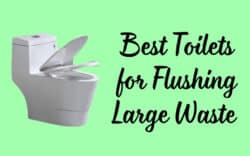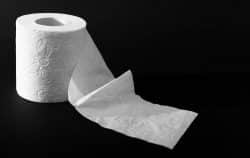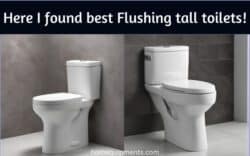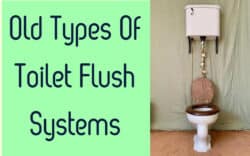How to avoid toilet paper residue: What you need to know
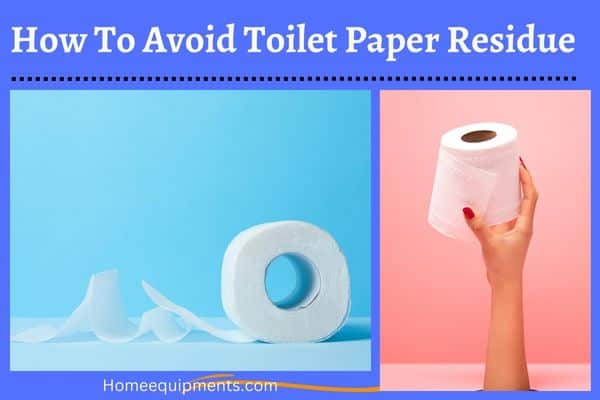
Toilet paper residue refers to the small bits of toilet paper that may be left behind on your butts or on the surface of the toilet bowl after flushing.
This can happen if the toilet paper is not used correctly while wiping your butts small particles of TP left on your body and some sticks to the sides of the toilet bowl. Toilet paper residue can be unsightly and may require cleaning to remove it. To prevent toilet paper residue, it is important to use a reasonable amount of toilet paper and to make sure nothing left on your body and nor on the toilet seat. Some people may also choose to use some alternatives to toilet paper or some special types of toilet papers that are specifically designed to dissolve more easily in water to reduce the likelihood of residue.
See also:
- The Best Ways To Prevent Toilet Paper Rolls From Unrolling
- 7 Best Toilet For Flushing Large Waste In 2023
To avoid leaving toilet paper residue in the toilet, there are a few things you can try:
How to Avoid Toilet Paper Residue in the Toilet
Here are some tips you can use to avoid the toilet paper residue in your toilet;
- Flush the toilet a few times after use to ensure that all the toilet paper has been fully dispersed.
- Use less toilet paper per flush. This will reduce the amount of residue left behind and may help to prevent clogs.
- Avoid flushing wipes, feminine hygiene products, or other non-biodegradable items down the toilet as these can contribute to clogs and residue.
- Consider using a toilet brush to scrub the inside of the bowl and help remove any residue that may have accumulated.
- If you are still having issues with toilet paper residue, you may want to consider switching to a different type of toilet paper that is more easily dispersible.
How to not leave toilet paper residue on your butt
To avoid leaving toilet paper residue on your butt, there are a few things you can try:
1. Use Sufficient Amount of Toilet Paper
Use a sufficient amount of toilet paper to clean yourself properly. This will help to ensure that all feces and urine have been removed, reducing the likelihood of residue being left behind.
It is not necessary to use a large amount of toilet paper to clean properly after using the toilet. In fact, using too much toilet paper can contribute to clogging the toilet and creating a mess.
The amount of toilet paper you need will depend on your personal preference and the type of toilet paper you are using. Some toilet paper is thicker and more absorbent than others, so you may need to use less of it to feel clean.
It is generally recommended to use enough toilet paper to effectively clean yourself, but not so much that it clogs the toilet or leaves a lot of residue in the bowl. If you are concerned about using too much toilet paper, you can try using a lower-ply or thinner toilet paper or experimenting with different amounts to find the right balance for you.
2. Correct Your Wiping Direction
Wipe from front to back to avoid spreading bacteria from the anus to the vulva or vagina.
It is generally recommended to wipe from front to back after using the toilet, especially for women, as this can help to prevent the spread of bacteria from the anus to the genital area. This is because the anus is located near the front of the body, while the genital area is located near the back. Wiping from front to back can help to reduce the risk of transferring bacteria from the anus to the genital area, which can potentially cause infections.
However, wiping from front to back is not a requirement and the direction that you choose to wipe is a matter of personal preference. Some people may find it more comfortable to wipe from back to front, and this is perfectly fine as long as you are effectively cleaning yourself and taking steps to reduce the risk of spreading bacteria.
It is important to use a reasonable amount of toilet paper and to take the time to thoroughly clean all areas that need attention. Washing your hands with soap and water after using the toilet can also help to reduce the risk of spreading bacteria.
3. Use a Bidet:
A bidet is a plumbing fixture that sprays water to clean the genitals, anus, and perineal area after using the toilet. Some toilets come with built-in bidets, or you can install a separate bidet attachment on your toilet.
Is bidet a good alternative to toilet paper?
Bidets can be a good alternative to toilet paper for several reasons:
More effective at cleaning: Bidets use a stream of water to clean the genitals, anus, and perineal area, which can be more effective at removing feces and urine than toilet paper.
More hygienic: Using a bidet can help to reduce the spread of bacteria and other germs that can be transmitted through the use of toilet paper.
More environmentally friendly: Using a bidet can help to reduce the amount of toilet paper that is used, which can be beneficial for the environment.
More comfortable: Some people find that using a bidet is more comfortable than using toilet paper, especially if they have sensitive skin or allergies.
However, it’s worth noting that bidets are not available in all countries and may not be an option for everyone. In addition, some people may prefer the convenience and portability of toilet paper.
4. Moist wipes:
Moist wipes, also known as wet wipes or flushable wipes, are pre-moistened towelettes that can be used to clean yourself after using the toilet. They are typically more effective at removing feces and urine than toilet paper and can be disposed of in the toilet.
Are wet wipes better then toilet papers
It’s worth noting that wet wipes are not always a more environmentally friendly option than toilet paper. While some wet wipes are labeled as “flushable,” they may not break down in the same way as toilet paper and can contribute to sewage blockages and other environmental problems. In addition, wet wipes may contain chemicals and fragrances that can be irritating to some people.
It’s also important to note that not all wet wipes are safe to flush. Only use wet wipes that are labeled as “flushable” and follow the manufacturer’s instructions for disposal.
5. Water Spray Attachment or Bidet Attachment:
Some toilets come with a water spray attachment aslo called bidet attachment that can be used to clean yourself after using the toilet. These attachments are typically located near the base of the toilet and can be activated by pressing a button or pulling a lever.
A water spray attachment is a device that can be attached to a toilet and used to clean oneself after using the toilet. It typically consists of a nozzle or series of nozzles that are located near the base of the toilet and can be activated by pressing a button or pulling a lever. When activated, the nozzles release a stream of water that can be used to clean the genitals, anus, and perineal area.
Water spray attachments can be a convenient and hygienic alternative to using toilet paper, as they use water to effectively clean and rinse away feces and urine. Some people find that using a water spray attachment is more comfortable and less irritating than using toilet paper, especially if they have sensitive skin or allergies.
Water spray attachments are commonly found in public restrooms and some private homes, particularly in countries where bidets are not as common. They can be installed as an additional feature on a new toilet or added to an existing toilet as an attachment.
6. Handheld and Portable bidet:
A handheld bidet or a portable bidet are separate devices that can attached with the toilet or filled with water and used to clean yourself after using the toilet. Handheld bidets and portable bidets are easy to use and can be more convenient than a traditional bidet if you do not have one installed in your bathroom.
Why handheld and portable bidet are better than toilet papers
Handheld and portable bidets can be a good alternative to toilet paper for several reasons:
More effective at cleaning: Handheld or portable bidets use a stream of water to clean the genitals, anus, and perineal area, which can be more effective at removing feces and urine than toilet paper.
More hygienic: Using a handheld or portable bidet can help to reduce the spread of bacteria and other germs that can be transmitted through the use of toilet paper.
More environmentally friendly: Using a handheld or portable bidet can help to reduce the amount of toilet paper that is used, which can be beneficial for the environment.
More comfortable: Some people find that using a handheld bidet is more comfortable than using toilet paper, especially if they have sensitive skin or allergies.
However, it’s worth noting that handheld or portable bidets are not as widely available as toilet paper and may not be an option for everyone. They also require the use of water, which may not be practical in all situations. In addition, some people may prefer the convenience and portability of toilet paper.
7. Reusable cloth and Sponge:
Some people choose to use a reusable cloth or sponge to clean themselves after using the toilet. These can be washed and reused, reducing the amount of waste produced. However, it is important to ensure that the cloth or sponge is washed thoroughly and dried completely between uses to prevent the spread of bacteria.
Reusable cloths are pieces of fabric that can be used as an alternative to toilet paper for cleaning after using the toilet. Some people choose to use a reusable cloth or sponge to clean themselves instead of using disposable products like toilet paper or moist wipes.
Reusable cloths can be made from a variety of materials, such as cotton, bamboo, or microfiber. They can be washed and reused, reducing the amount of waste produced compared to disposable products.
Using a reusable cloth can be a more environmentally friendly option than using disposable products, but it’s important to ensure that the cloth or sponge is washed thoroughly and dried completely between uses to prevent the spread of bacteria. Some people may also prefer the convenience and portability of disposable products like toilet paper or moist wipes.
Sponges can be used as an alternative to toilet paper, but they may not be the most practical or hygienic option.
One issue with using sponges as a toilet paper alternative is that they can be difficult to clean and disinfect properly. Toilet paper is designed to be disposable, so it does not need to be washed after each use. Sponges, on the other hand, should be washed and disinfected after each use to prevent the spread of germs. This can be time-consuming and may not be practical for everyday use.
In addition, sponges may not be as effective at cleaning and drying the skin as toilet paper. Toilet paper is specifically designed to be absorbent and gentle on the skin, while sponges may not provide the same level of cleaning and drying.
Finally, using sponges as a toilet paper alternative may not be environmentally friendly, as sponges are not biodegradable and can take a long time to break down in landfills. Toilet paper, on the other hand, is made from paper, which is a renewable resource and can be recycled or composted.
Overall, while sponges may be used as a temporary toilet paper alternative in a pinch, they are not the most practical or hygienic option for everyday use.
Why Do Some People Wipe So Much after a bowel movement?
There are a few reasons why some people may feel the need to wipe excessively after a bowel movement:
1. Personal preference:
Some people may simply prefer to feel clean and dry after using the bathroom, and may therefore wipe more thoroughly to ensure that all traces of feces are removed.
2. Medical conditions:
Certain medical conditions, such as inflammatory bowel disease (IBD) or anal fissures, can cause irritation or discomfort in the anus, leading to a desire to wipe more thoroughly.
3. Poor toilet habits:
Some people may have poor toilet habits, such as not fully emptying their bowels or not using enough toilet paper, which can lead to a feeling of incomplete cleaning and the need to wipe more.
4. Anxiety or obsessive-compulsive disorder (OCD):
In some cases, excessive wiping after a bowel movement may be related to anxiety or OCD, as it can become a compulsive behavior that provides a sense of control or cleanliness.
Overall, it is important to remember that everyone’s bowel habits are different, and what may be normal for one person may not be for another. If you are concerned about your wiping habits or have any other questions about your bowel movements, it is always a good idea to speak with a healthcare professional.
What are the complications of excessive wiping?
Excessive wiping can lead to irritation and inflammation of the skin in the anus and perineum (the area between the anus and genitals). This can cause symptoms such as redness, itching, burning, and discomfort.
Here are some of the major complications due to excessive wiping?
1. Anal Skin Tags
Anal skin tags are small, benign growths that can appear around the anus. They are typically made up of extra skin that has become stretched or swollen and protrudes from the surrounding tissue. Anal skin tags are usually harmless and do not cause any symptoms, but they can be unsightly and cause embarrassment or discomfort when they rub against clothing or during bowel movements.
If you have anal skin tags and they are causing discomfort or embarrassment, you may want to speak with a healthcare professional about treatment options. Treatment options may include removing the skin tags surgically or using cryotherapy (freezing the skin tags off) or other methods. It is important to note that anal skin tags are usually harmless and do not require treatment unless they are causing problems
2. Hemorrhoids,
Hemorrhoids also known as piles, are swollen veins in the anus and rectum that can cause discomfort and bleeding. One common symptom of hemorrhoids is the feeling of incomplete bowel movements, which can lead to excessive wiping.
Excessive wiping after a bowel movement can also cause or exacerbate hemorrhoids, as it can lead to irritation and inflammation of the anus and rectum. Therefore, it is important for people with hemorrhoids to be mindful of their wiping habits and to use enough toilet paper to clean themselves properly without over-wiping.
3. Anal fistula
Anal fistula is a small tunnel that forms between the skin and the muscles of the anus, usually as a result of an infection or abscess in the anal area. Anal fistulas can cause discomfort, pain, and discharge, and they may require medical treatment.
Excessive wiping after a bowel movement may not necessarily be a symptom of an anal fistula, but it can cause irritation and discomfort in the affected area. It is important for people with an anal fistula to be mindful of their wiping habits and to use enough toilet paper to clean themselves properly without over-wiping.
4. Irritation and inflammation
Excessive wiping or using too much force when wiping can cause irritation and inflammation of the skin around the anus, leading to discomfort and pain.
5. Anal fissures
Wiping too hard or using rough toilet paper can cause small tears in the skin around the anus, known as anal fissures. These can be painful and may cause bleeding.
6. Bacterial infections:
Poor wiping habits can also lead to the spread of bacteria from the anus to the surrounding area, potentially leading to infections such as cellulitis or abscesses.
Bottom Line
Overall, it is important to use enough toilet paper to clean oneself properly after a bowel movement, but not to over-wipe or use too much force, as this can lead to irritation and other complications. If you are experiencing any discomfort or symptoms related to your wiping habits, it is a good idea to speak with a healthcare professional for advice and treatment.

![7 Best Shower head to increase water pressure in 2024 [Tested & Reviewed]](https://homequipments.com/wp-content/uploads/2023/09/Best-Shower-head-250x156.jpg)
